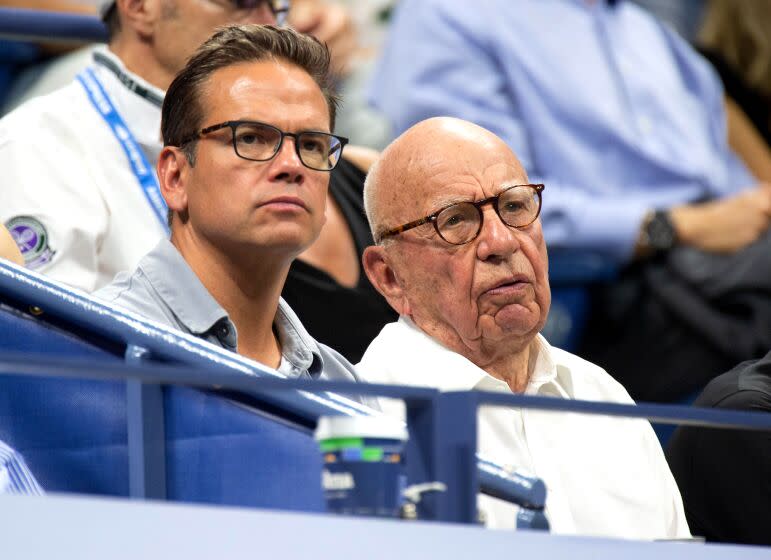Rupert Murdoch has abandoned his bid to reunite the two halves of his media empire.
Facing resistance among leading investors, the 91-year-old mogul and his son Lachlan on Tuesday notified the respective boards of Fox Corp. and News Corp. that the family was withdrawing its earlier request to explore a combination of the two companies. Such a merger would have brought Fox News and the Wall Street Journal under the same corporate roof.
A merger also would have consolidated the power of Lachlan Murdoch, currently chief executive of Fox, as he would have managed the combined company.
The Murdochs did not detail their reasons for dumping the merger talks less than three months after instigating them. A company statement said Rupert and Lachlan Murdoch "have determined that a combination is not optimal for shareholders of News Corp and Fox at this time."
Major investment firms, including T. Rowe Price and Independent Franchise Partners, reportedly were skeptical that a merged entity would increase shareholder value. Winning over enough shareholders to approve the deal was increasingly problematic for the Murdoch family, which holds about 39% of the voting shares but less than 15% of the economic value of the two companies.
Another wrinkle emerged more recently. News Corp. entered into negotiations to sell one of its prized assets — its 80% stake in Move Inc., operator of the successful Realtor.com website business, according to knowledgeable people who were not authorized to speak publicly. News Corp. wanted to focus on maximizing that potential multi-billion-dollar deal, these people said. Late Tuesday, News Corp. confirmed the sales talks in a regulatory filing in Australia, saying it was "engaged in discussions with CoStar Group, Inc. regarding a potential sale of Move, Inc."
Rupert Murdoch had wanted to stitch back together the company he spent more than 50 years building.
A decade ago, investors successfully pressured Murdoch to break up the company, arguing that its print publications, including dozens of newspapers in Murdoch's native Australia, were pulling down the value of the company. The breakup came in the wake of the British cellphone hacking scandal at Murdoch-owned tabloids in London, which tarnished the family's reputation and led to hundreds of millions of dollars in legal costs, including payouts to victims.
Now, it's the television company that potentially has significant legal exposure. Dominion Voting Systems has filed a $1.6-billion defamation lawsuit against Fox Corp., alleging that Fox News perpetuated former President Trump’s false claims about the election being "stolen" to placate viewers who were alienated by the network’s early but ultimately accurate call that Biden had won Arizona, putting him on the path to victory.
At a hearing last month, an attorney for Dominion revealed some of the testimony Fox News hosts and executives have given in depositions in which they acknowledged skepticism over the claims presented by Trump’s representatives. The attorney quoted Fox News host Sean Hannity as saying under oath that he “did not believe it for one second.”
The Dominion case is headed for trial this spring.
Fox News has maintained that its reporting on the allegations of voter fraud during the 2020 election, as alleged by Trump and his lawyers, was newsworthy and protected by the 1st Amendment.
Murdoch's empire is smaller than it once was. In 2019, the mogul sold much of Fox's entertainment holdings to Walt Disney Co. for $71 billion. That left Fox Corp. with Fox News, Fox Business News, the Los Angeles-based Fox network, two cable sports channels and the Tubi streaming service. The publishing titles — including Dow Jones, the New York Post, the Times of London and the Sun tabloid — reside in News Corp., which also has Australian TV assets.
In the statement, the companies said that their board committees looking at the merger proposal have been dissolved.
Times staff writer Stephen Battaglio contributed to this report.
This story originally appeared in Los Angeles Times.
Source: Read Full Article








